What’s On My Bookshelf: Challenge II Resources
The Classical Conversations Challenge II program is one of my favorites. With British literature, artists and composers, and Socratic dialogues, I feel a bit indulgent as a tutor to walk through these studies with students. I love that many of the things I collected from my Foundations years are revisited in Challenge II. It is a year of contemplating choices, and it is rich with great content.
As with all of my resource book lists, these items are all optional. Sometimes, in order to wrap your head around something, you need a little more help. So here are my helps for Challenge II, strand by strand.
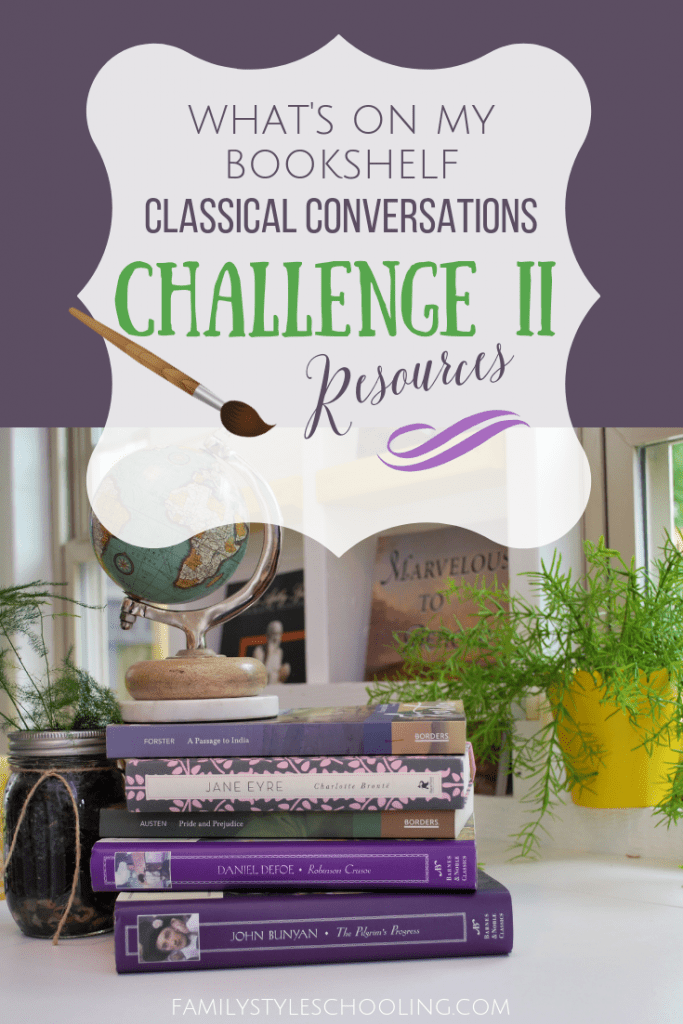
Latin
We're finally promoting to Henle's Second Year Latin book. This is exciting and scary. Not all students make it through the first year book, but that's okay. If they've mastered the concepts through Lesson 26, they can move on to the second year book.
However, they shouldn't fully retire that purple book. There isn't a whole lot of explanation of concepts in the second year book, so you'll want to refer back to the first year book to fill in the gaps.
In the second semester, you start translating some of Caesar's conquest of Gaul. We struggled some in this work because the story was so unfamiliar to us. I found this English translation of the work super helpful for tracking with the ideas!
Latin with Andy also has resources for all of the lessons in Henle 2, along with vocabulary sheets, flashcards, and other great resources!
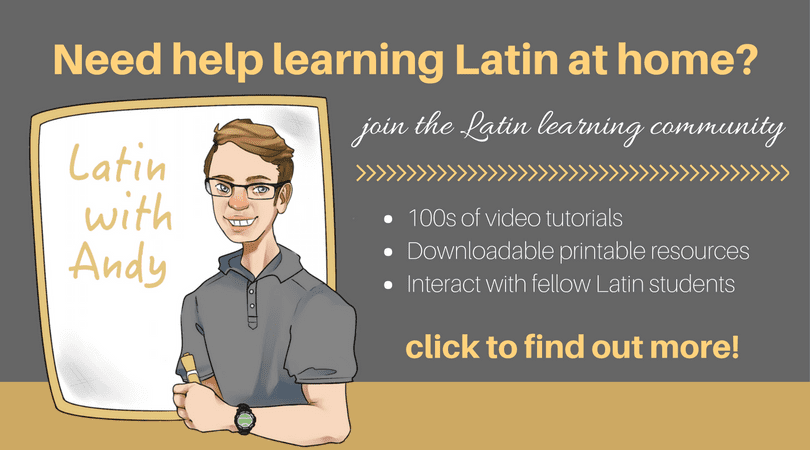
Debate
Western Cultural History
Walking through Francis Schaeffer's book How Should We Then Live, students gain an understanding of how the philosophies of the day are expressed in the arts.
"Art is a reflection of God’s creativity, an evidence that we are made in the image of God."
Francis Schaeffer
The video series that goes along with the text is available on Amazon Prime. I have the DVD set to watch in class, but this is great for families to watch together at home and discuss.
Another great resource I've gathered over the years are the Picture Portfolios by Simply Charlotte Mason. I love having these large, full color versions of the paintings to enjoy observing together for all of those comparison papers they'll be writing!
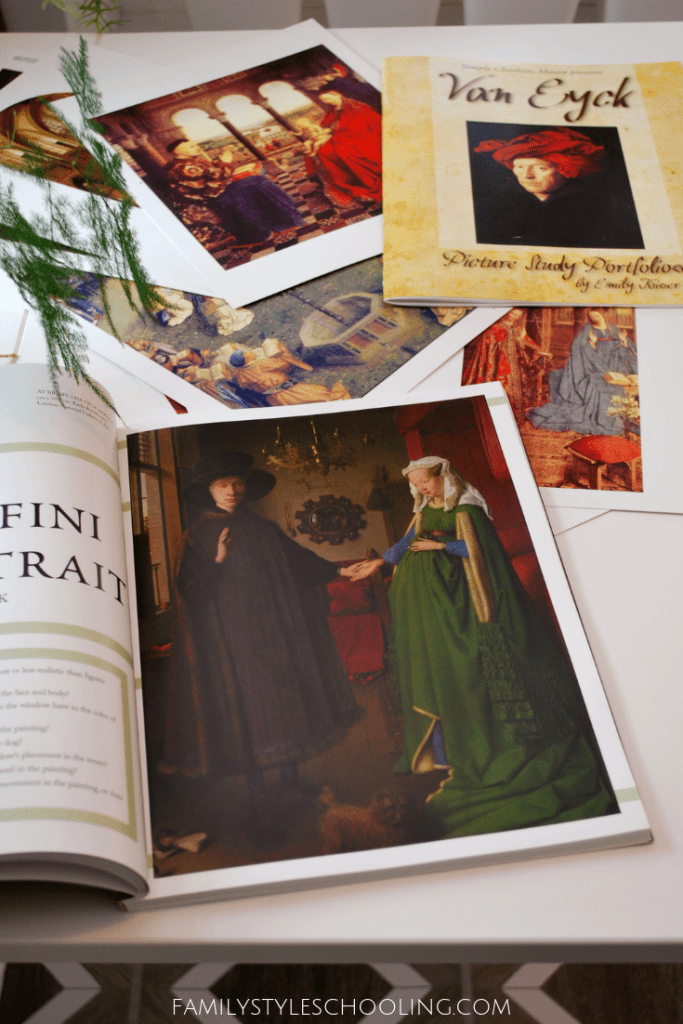
Along with these pictures, I've collected a variety of books that give additional background information on the artists. These books are great resources for cultivating great discussions in the classroom.
Policy Debate/Lincoln Douglass Debate
Another aspect of the Debate strand in Challenge II is actual policy debate and Lincoln Douglass debate. My very favorite resource is the Debate Trivium Table.
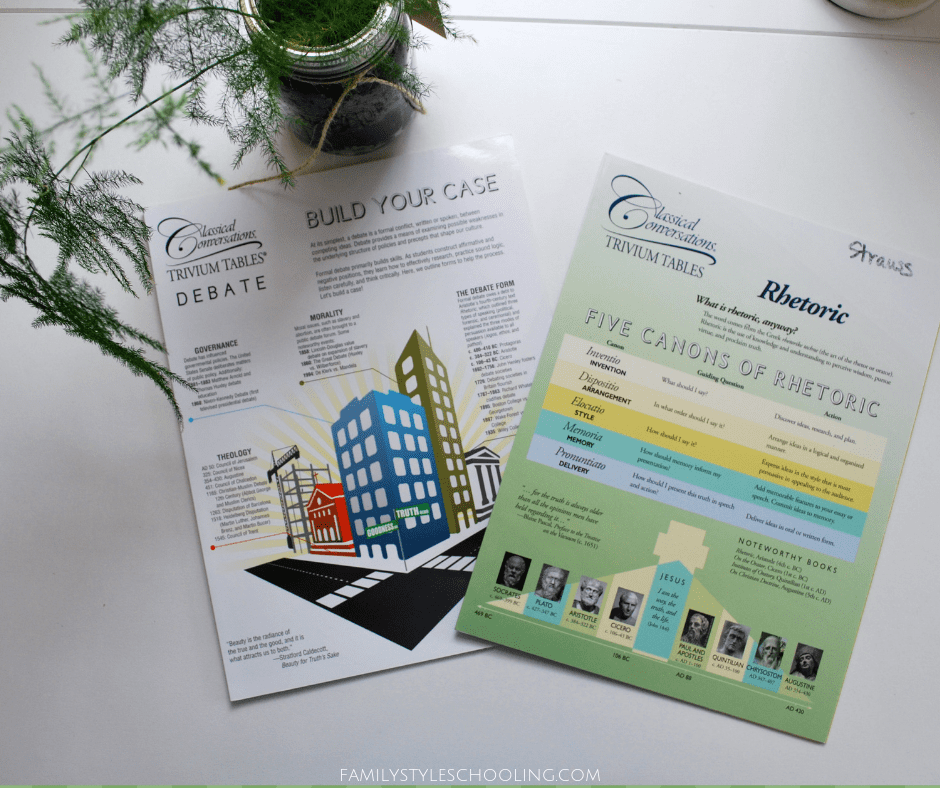
It includes such great information about the flow of a debate, the purposes of each part, and what to watch for (stock issues).
In the second semester, students are introduced to Lincoln Douglass debates which focus on debating morals. One of the topics they can debate is whether one should risk their life for art. This is a great topic as they've been immersed in the study of the arts all year. Some excellent movies that help walk students through this idea are The Monuments Men and The Rape of Europa.
Exposition
Oh my favorite subject! First of all, if you haven't seen my Challenge reading trackers, you need to find those and print them off. There are so many amazing books to read in Challenge II that parents will want to dive in with their students!
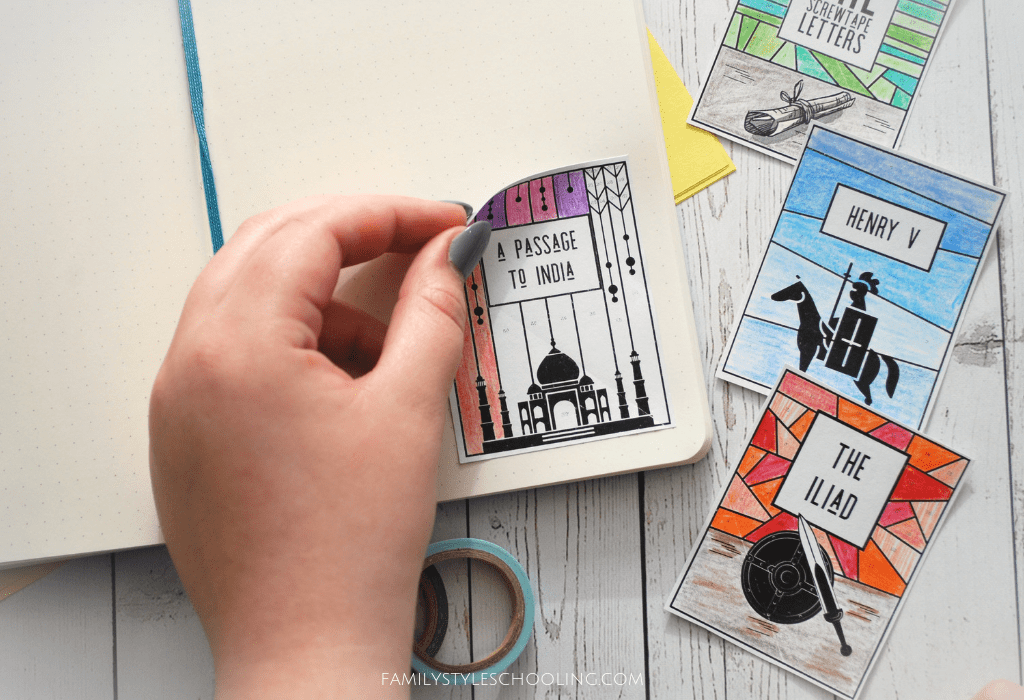
Socratic Circles
I introduced my Challenge I students to Socratic Circles at the end of the year. This is an amazing way for students to discuss a book together.
Basically, we had two circles of students: an inner circle (the discussers), and an outer circle (the observers). I set a timer for ten minutes and allow the inner circle to discuss the assigned reading using open-ended questions like the ones on my conversation placemat.
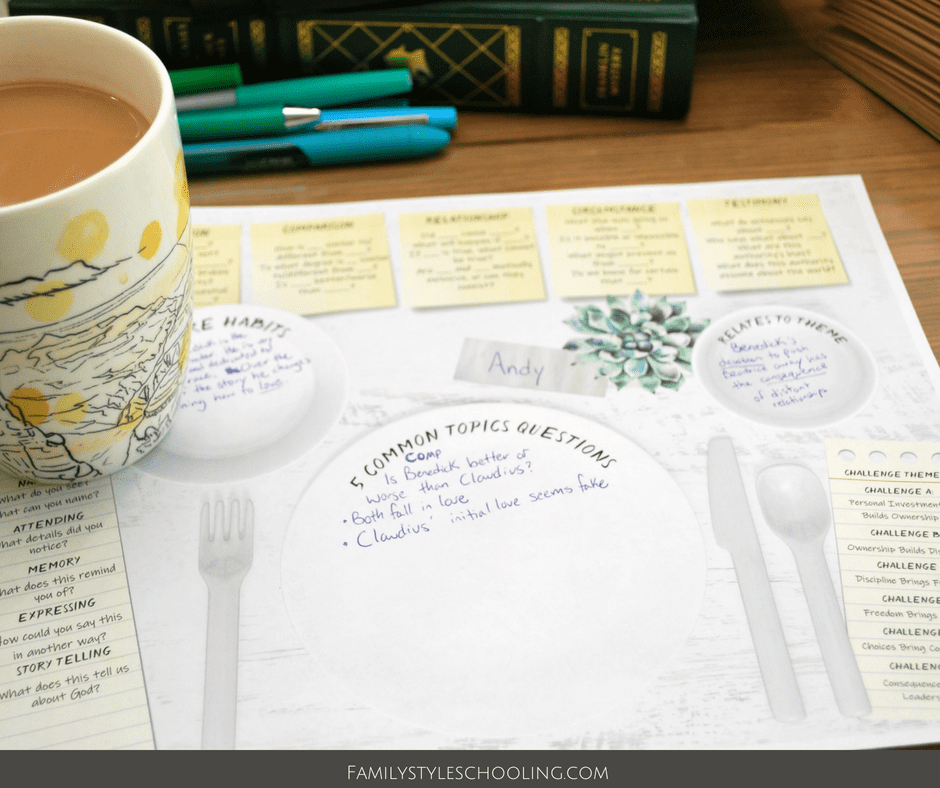
The outer group has one person in the inner circle that they focus on to assess their participation in the discussion. I printed the first sheet of this resource for them to use as a scale for assessment.
What ends up happening is that the inner group focuses harder on having an excellent conversation because they know that they're being watched. The outer group focuses on listening well because they know that they'll have to assess the inner group.
Once the timer is done, the inner group is quiet, and the outer group tells their partner what they did well and what the most interesting addition to the conversation that they heard. They also get an opportunity to share what they would have added to the conversation.
Then everyone switches places, the timer is set for another ten minutes, and another conversation starts. This has been such a great way to deepen conversations and whet the appetite for more. I've found they don't want to stop discussing once they've tasted good discussion,
Here are some other options for socratic discussions:
British Literature
There are so many great books in the line up for Challenge II. Some of them can be daunting though, so I love having some of these fun abridged versions that help students get the idea of the story before tackling it.
Movies are also a fun way to enjoy the books, however, I believe that this is only a good option after you've read the book! As these stories get more "adult" you should always check out the movie's reviews before watching it with the whole family!
Worldview Literature Guides
I love the Worldview Guides from Canon Press. I have a couple that walk through the books we read this year:
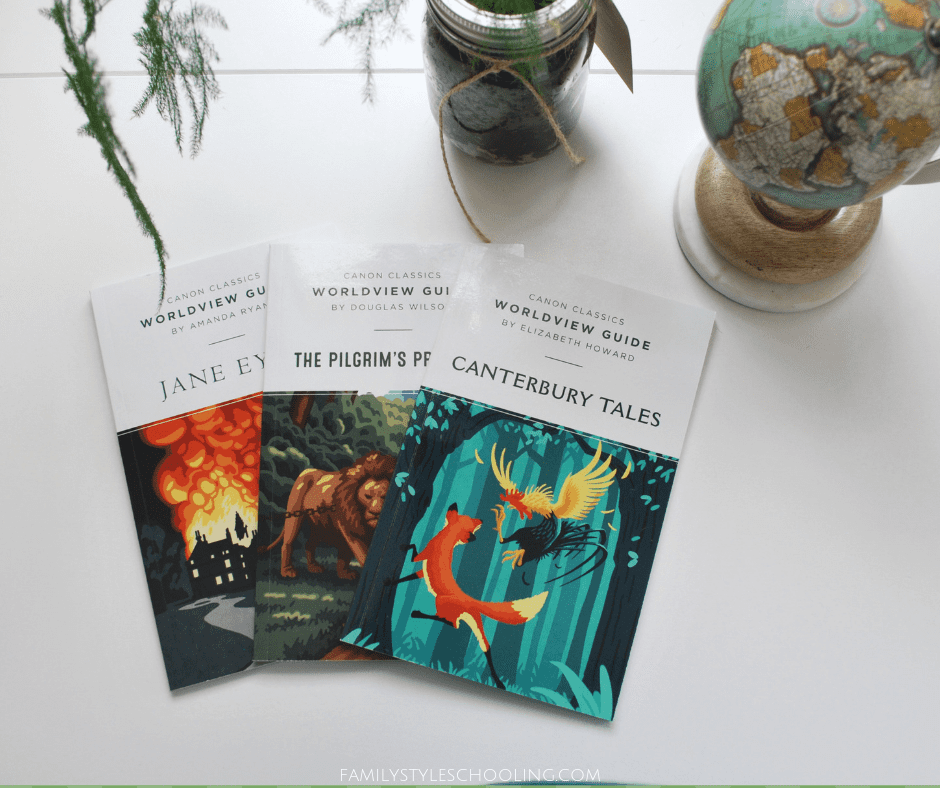
Another one of my favorite thinkers is Peter Leithart. He has some excellent resources for Jane Austin novels including a glimpse into the morals written into the stories, and a biography of the author herself. Leithart's writing challenges me to think at a deeper level. I love that.
Biology
As a Challenge director, this seminar requires the most expensive supplies. Thankfully, our community has had a few years of Challenge II classes to build up a good stash of the basics to build off of. The labs are all done in community, so if you're not a director, you don't need any of this.
We opted for one microscope that connects to a computer for logging our work.
The other microscope is basic without the extra features, but it does the job well.
Sometimes, no matter how hard you try, getting the perfect specimen on a slide is nearly impossible. I love having these prepared slides for backup.
I like to use Carolina Biological Supply company for my specimens and tools for dissection.
Reasoning
Logic
In Challenge II, students take on Advanced Formal Logic and begin to apply the skills they've been learning to actual writings. One of the challenges they face is finding good articles that express the types of syllogisms they're studying. Here are some great options:
Plato's Dialogues
In the second semester, students read through and discuss Plato's dialogue: Crito. Basically, Socrates has been convicted of polluting the minds of youth in the previous dialogue, Apology. While he's in prison awaiting his execution, Crito, his good friend, shows up to try to convince him to escape and save his life. It's a really fascinating discussion.
As far as this goes, I've found that the more of Socrates dialogues I've read, the more they build on one another. They're short and pretty easy to understand (surprisingly). This is a fun seminar which yields great discussion.
There are so many great branches of study in Challenge II. I look forward to digging into them again with my next round of students.
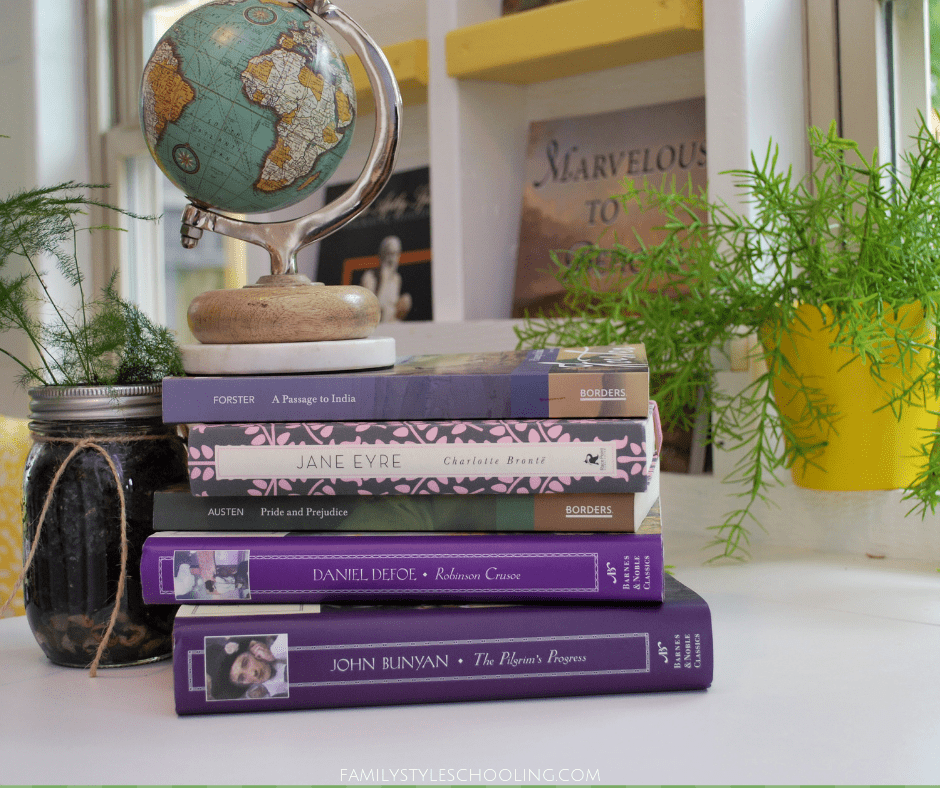
Looking for resources from another level?
Betsy Strauss is an unexpected homeschooler, mother of three, who is in a relationship with a sweet man for life. She loves reading books, drinking coffee, and learning anything with her kids.


Thank you SO MUCH for sharing your resources with us! As a new CH. 2 director for next year, I really appreciate any helpful direction I can get before I embark on this new adventure. The Picture Portfollios by Charlotte Mason you mentioned above… there are quite a few! If you could only get a couple, which would be the most useful in class? Thank you~
Hello:) I have a membership and was able to download all of Henle Latin Unit I flashcards, but am unable to access the links to Unit II and above. How do I go about doing this? Thanks! Kim
You will need to log in to the Latin with Andy dashboard and then go to the tab called “Printables.” You should find all flashcards there. Hope that helps!
This was WONDERFUL! Thank you for sharing!